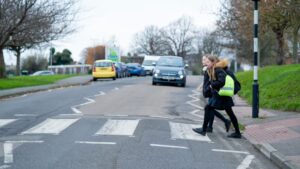There is an urgent need to find a more ‘appropriate basis’ for the HM Treasury block grant from Westminster to fund highways and transport in Wales.
This is according to Professor Stuart Cole, CBE. Emeritus Professor of Transport Economics and Policy, University of South Wales, who was writing on Nation Cymru giving his thoughts on what the General Election manifestos mean for transport in Wales.
“One might have expected changing the Barnett formula to be a key fiscal manifesto item; but there is no reference in any of the manifestos. And neither the past Labour nor Conservative UK governments made any attempt to change the process – so acceding to HM Treasury objections,” he said.
The Green Party wants annual bus and rail subsidies rise to £10 bn with free bus travel for the under-18’s and an investment of £19 bn in public transport including electrifying more rail routes and more active travel routes.
Professor Cole said bus services in Wales have faced financial challenges for some years, made worse by Covid related reductions in passenger numbers. This affected the bus companies directly though there were savings to Welsh Government in senior citizens bus-pass expenditure.
“The present system in Wales has bus companies registering profitable services and the remainder put out through a revenue support tender by local councils. This has always given instability to the service networks and thus to travellers particularly in rural areas where the bus is the main form of public transport,” he added.
Central to all the manifestos (except the Conservatives) was to repeal the discredited bus deregulation legislation and parallel the London / Manchester bus contracting model.
Many small bus operators serve their local area well, but support for them is not mentioned in any of the manifestos. They have complained that in some of the policies (e.g. on electric buses) it would be difficult for them to achieve financial viability, said Professor Cole.
On transport integration, he said bus and rail users agree with the Welsh Government’s One network, One timetable, One ticket plan. As Labour seem to refer to Wales as the way forward we can expect this to happen more widely in England.
On roads, Professor Cole said three areas are highlighted which provides a degree of controversy. The 20-mph speed limit, the road investment programme and potholes.
“All three feature in the various manifestos but should be seen as the responsibility of the Welsh Government and thus more relevant in the next Senedd elections The Conservatives and Reform propose that the UK Government override the Senedd’s democratic decision to pass the 20-mph speed limit legislation and change it to local consent for each local area and scheme. Its introduction was not particularly well handled, nor was there a full economic evaluation.”
“An interesting dichotomy arises from the Labour manifesto despite holding Wales up as the model for its GB policies. It has the modernisation of our transport infrastructure including long-awaited new road projects set against the Welsh Government commitment to cut back on such projects. Perhaps Labour’s London HQ has spotted that the motor car is still the most popular mode of passenger transport,” reported Professor Cole.
Finalising his thoughts, Professor Cole added: “There are many transport promises in the manifestos. However, they do not make clear what their specific policies are for Wales and what the consequent transport expenditure will be. However, to meet their promises in Wales the Labour party claim of ‘fully costed expenditure’ for England should increase significantly the Welsh block grant.”
PIC-.gov.uk
























